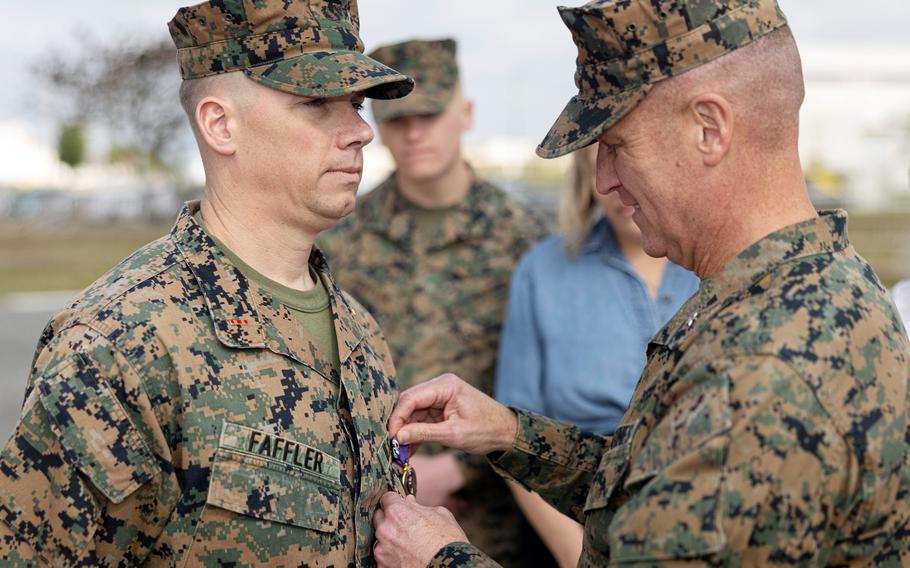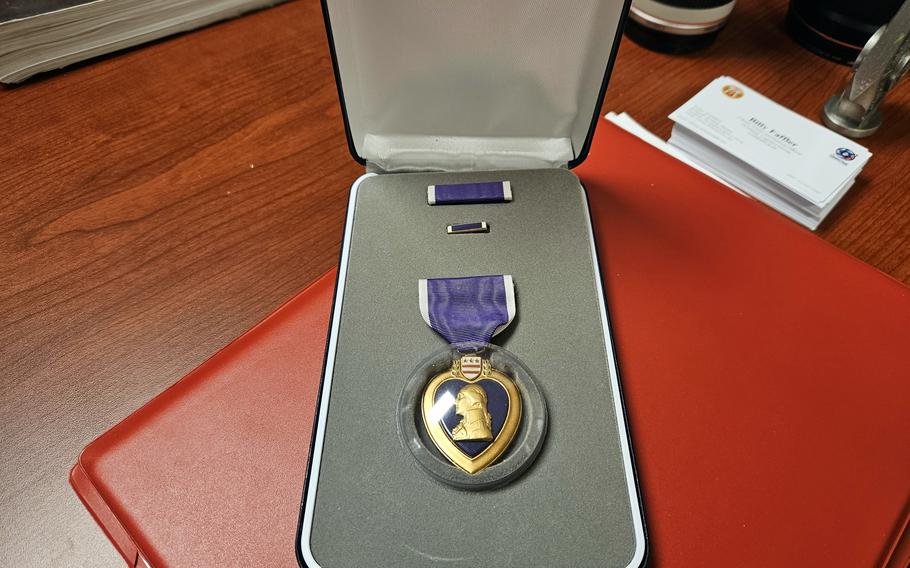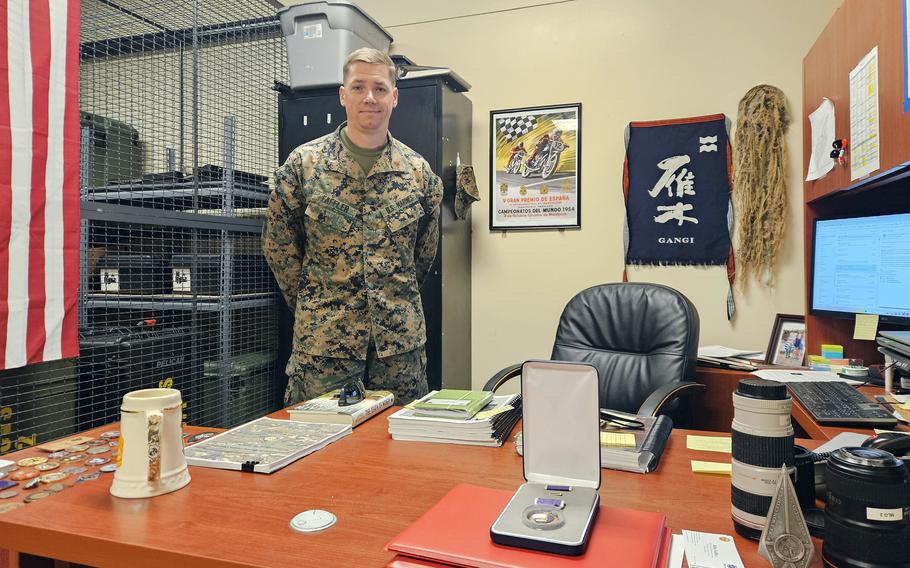
Brig. Gen. Kevin Collins, commander of the 3rd Marine Logistics Group, presents a Purple Heart to Chief Warrant Officer 2 William Faffler at Camp Kinser, Okinawa, Jan. 6, 2025. (Weston Brown/U.S. Marine Corps)
CAMP KINSER, Okinawa — Marine Cpl. William Faffler was two months into his only deployment to Afghanistan when his mine-resistant ambush protected vehicle, or MRAP, rolled over a 120-pound roadside bomb.
Faffler, now a chief warrant officer 2, was a combat cameraman recording video on a route clearance mission with the Army’s Task Force Thor in Helmand province, May 2, 2010.
“After four hours of rolling, I turned [the camera] off for a second, and, of course, that’s exactly when it happened,” Faffler, a visual information officer with 3rd Marine Logistics Group, told Stars and Stripes on Wednesday.
The blast knocked him unconscious for two minutes, according to a Jan. 6 news release from the logistics group.
During a Jan. 6 ceremony at Camp Kinser, Faffler collected two Purple Hearts, long overdue. Both medals recognized Faffler had suffered traumatic brain injuries while in action, injuries that went undiagnosed until last May, he said.
He earned the second Purple Heart on Oct. 25, 2010, during a foot patrol with Bravo Company, 1st Reconnaissance Battalion. Cpl. Todd Love, walking point ahead of Faffler, stepped on an IED and lost both legs and his left arm.

Chief Warrant Officer 2 William Faffler recently received two Purple Hearts for traumatic brain injuries he sustained in Afghanistan in 2010. He now serves as a visual information officer for the 3rd Marine Logistics Group at Camp Kinser, Okinawa. (Brian McElhiney/Stars and Stripes)
“Half the guys from my team were pretty out of it. They got a good chunk of that blast,” Faffler said.
Those blasts were among hundreds experienced by patrols during the deployment, retired Col. Robert Gardner, at the time the operations officer with 1st Marine Division, I Marine Expeditionary Force, told Stars and Stripes in an email Thursday.
“Many Marines were reluctant to acknowledge those invisible blast effects since a ‘three strike rule’ was in effect where if they suffered three blasts, they would not be able to go outside the wire for the rest of their deployment,” he said. “And no Marine wants to let his fellow Marines down by not being there.”
Many service members fear being stigmatized as weak or unfit for duty if they seek treatment for traumatic brain injuries, or TBI, according to Sgt. Major of the Marine Corps Troy Black, who talked about TBI for a Health.mil podcast in March.
They may not recognize the symptoms, have concerns about their mental health or harbor other misconceptions about TBI, said Black and others on the podcast.
Faffler and his wife, Katie Faffler, both from Minneapolis, and their four children struggled for years with Faffler’s symptoms, which included forgetfulness, personality changes and insomnia.

Chief Warrant Officer 2 William Faffler stands in his office at 3rd Marine Logistics Group headquarters on Camp Kinser, Okinawa, Jan. 22, 2025. He recently received two Purple Hearts for traumatic brain injuries sustained in Afghanistan in 2010. (Brian McElhiney/Stars and Stripes)
“You just don’t realize all the sacrifice you’re doing these years even after deployments and stuff and how it affects your family, because you just keep going,” Katie Faffler said by phone Wednesday. “Looking back now, I’m like, oh, all those things make sense now.”
Faffler attributed some symptoms to post-traumatic stress disorder. He explained it as a “software-hardware issue.”
“Software is like a bug fix, it just takes time to work it out; you’re just processing a crazy thing that happened to you,” he said. “And we did that – we got past that point, I feel like, that we could put it in its box. … But then there was always this thing that I couldn’t get over.”
Faffler is taking supplements for the neurotransmitter gamma-aminobutyric acid, or GABA, which has a calming effect, and is weighing other treatment options. He also wants to help other Marines with service-related brain injuries receive Purple Hearts.
“I know that there’s so many people out there that don’t have that validation, and you feel a little crazy,” he said. “If you have these things and you know there’s just something wrong, but everyone’s telling you, ‘Ah, no, you’re OK,’ that’s a very weird spot to be in.”